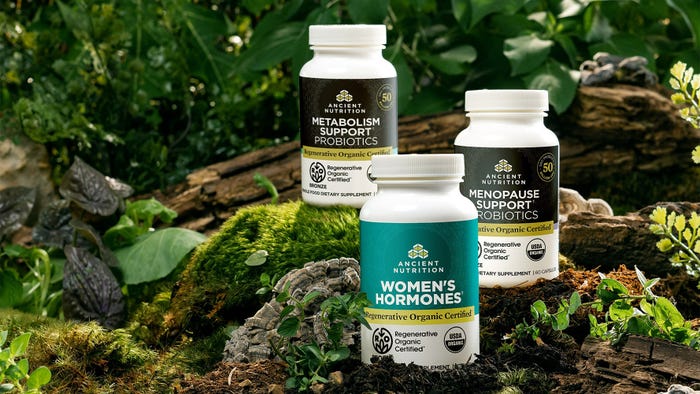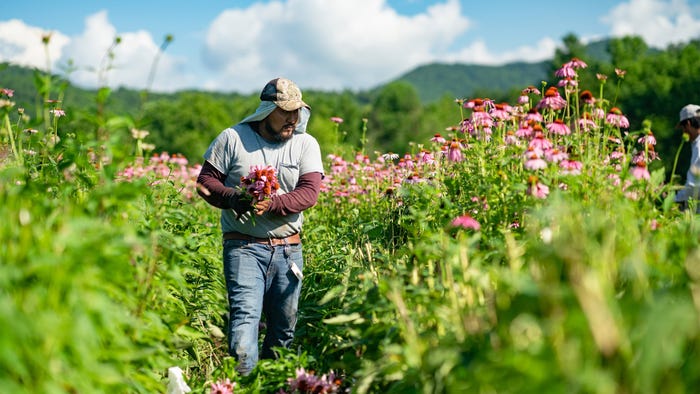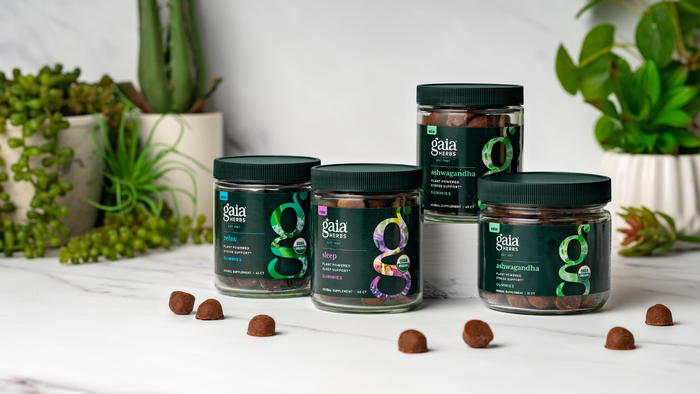2 dietary supplement brands support soil health while growing ingredients
Ancient Nutrition, Gaia Herbs own Regenerative Organic Certified farms to ensure traceable, transparent supply chains for consumers. Learn more.

Not every natural dietary supplement brand purchases its ingredients from an overseas farm via a network of distributors. Some grow turmeric, galangal, valerian root, skullcap and other botanicals to make the gummies, capsules and tinctures consumers want.
Ancient Nutrition and Gaia Herbs both follow Regenerative Organic Agriculture practices in growing ingredients for their natural dietary supplements.
Ancient Nutrition owns farms in Tennessee and Missouri that grow everything from ginger to aronia berries. In addition to botanicals, the brand also raises livestock, including chickens, to incorporate regenerative agriculture practices. Ancient Nutrition’s farms were the first in their states to become Regenerative Organic Certified (ROC).
The company’s first line of ROC supplements—a suite of 16 products launched in October—about 95% of the active ingredients are grown on Ancient Nutrition’s farms.
 Jordan Rubin is a co-founder and the CEO of Ancient Nutrition
Jordan Rubin is a co-founder and the CEO of Ancient Nutrition
“Our regenerative product launch was the most successful since our founding,” said co-founder and CEO Jordan Rubin. “It’s very gratifying.” For Rubin, who envisions his farms as research centers for regenerative agriculture, success touches on more than sales. It’s also about soil and overall environmental health. Ancient Nutrition has partnered with the nonprofit Rodale Institute, the birthplace of the modern organic agriculture movement, for help with science, research and farming savvy on the farms.
 Ancient Nutrition launched a line of Regenerative Organic Certified supplements, designed to support women during menopause, in October 2023.
Ancient Nutrition launched a line of Regenerative Organic Certified supplements, designed to support women during menopause, in October 2023.
For two years, Ancient Nutrition has been measuring dozens of soil markers. And the regenerative practices Ancient Nutrition deploys has led to striking improvements in soil quality at both farms.
More than 30 outdoor crops, including more than 17,000 turmeric plants, grow on the Tennessee farm. The operation’s greenhouse—where plants grow in soil, rather than sterile growing mediums—supports a wide variety of botanicals, including tropical plants like papaya, moringa and guava.
Ancient Nutrition’s commitment to farming doesn’t translate into quick financial savings. Farming requires an extraordinary amount of physical labor. It’s fickle, too: Rough weather can wipe out a year’s crops. Selling the idea was not a breeze for Ancient Nutrition.
“Everyone knows that regenerative agriculture is important, but still—board meetings have been interesting,” Rubin said. “I wish I could say we are producing turmeric for less than we could buy it. But I’ve been in the industry for 26 years and I’ve never had a compelling reason for big retailers to come visit me at headquarters. To date, between our farms, we’ve been visited by nearly every major retailer at least once with leadership.”
 Credit: Gaia Herbs
Credit: Gaia Herbs
Gaia Herbs
Supplement farming has been part of the Gaia Herbs way since the late 1990s. when the company moved from Massachusetts to North Carolina, where it started the farming operation. The operation today, which comprises close to 300 acres in the Blue Ridge Mountains, grows between 30 and 40 botanicals a year, including ginkgo, bacopa, passionflower and echinacea. Farming accounts for about 25% of the biomass Gaia requires to manufacture its broad line of supplements.
 Brian Traylor, COO, Gaia Herbs
Brian Traylor, COO, Gaia Herbs
The farm represents “the single most recognizable and interesting part of what we do, from our own internal team to the consumers and retailers we deal with. It’s become one of the identities of the organization,” said Chief Operating Officer Brian Traylor.
But farming for Gaia is about much more than taking retailers on tours and showcasing the colorful acreage on Instagram. The principal advantages revolve around business strategy.
“It gives us more control over the materials we are using. Supply chain has been a big issue, so there is some reliability with growing your own,” Traylor said. “Quality is also a big piece. Sometimes it’s hard to find ingredients that meet our specifications for organic, or for potency. And pricing can be challenging too.”
 Gaia Herbs started farming its own ingredients since the late 1990s. Credit: Gaia Herbs
Gaia Herbs started farming its own ingredients since the late 1990s. Credit: Gaia Herbs
Gaia doesn’t grow all the herbs it requires in its formulations, and the team is constantly assessing its own inventory, which helps determine what needs to be sourced from elsewhere. Some botanicals, such as fresh oats, can only be grown on the farm. Gaia might skip growing others due to cost.
“Sometimes it makes sense to grow, and sometimes to buy,” he said. “What we grow on the farm changes from year to year. There is a cost to farming yourself, from materials to labor and more. But multiple aspects of farming make it advantageous.”
One big benefit revolves around the setting: Staffers spend their lunch hours wandering through the fields. Sometimes, they volunteer to engage with harvests or to work in the greenhouse. The company holds special tours for retailers every year and invites the community in for visits every month.
“Mountains are all around, and the farm is in a valley where the soil is extremely fertile,” Traylor said. “The location is idyllic. Everybody loves the views. We even have the French Broad River flowing behind the property—it’s the third-oldest river in the world, and one of the few that flows north. Water is plentiful, and the setting is just gorgeous.”
About the Author(s)
You May Also Like




